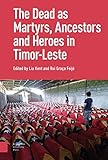The Dead as Ancestors, Martyrs, and Heroes in Timor-Leste / ed. by Lia Kent, Rui Feijo.
Material type: TextPublisher: Amsterdam : Amsterdam University Press, [2020]Copyright date: ©2020Description: 1 online resource (326 p.)Content type:
TextPublisher: Amsterdam : Amsterdam University Press, [2020]Copyright date: ©2020Description: 1 online resource (326 p.)Content type: - 9789048544448
- Death -- Social aspects -- Timor-Leste
- Funeral rites and ceremonies -- Timor-Leste
- Anthropology
- Asian Studies
- Heritage Studies
- Politics and Government
- South East Asia
- POLITICAL SCIENCE / Colonialism & Post-Colonialism
- The dead
- Timor-Leste
- ancestors
- heroes
- identity narratives
- imagining nation and state
- martyrs
- GT3286.T56 D43 2020
- online - DeGruyter
| Item type | Current library | Call number | URL | Status | Notes | Barcode | |
|---|---|---|---|---|---|---|---|
 eBook
eBook
|
Biblioteca "Angelicum" Pont. Univ. S.Tommaso d'Aquino Nuvola online | online - DeGruyter (Browse shelf(Opens below)) | Online access | Not for loan (Accesso limitato) | Accesso per gli utenti autorizzati / Access for authorized users | (dgr)9789048544448 |
Frontmatter -- Table of Contents -- List of Figures -- Preface -- Introduction -- Part I Ancestors, Martyrs and Heroes -- 1 Ancestors and Martyrs in Timor-Leste -- 2 Remembering the Martyrs of National Liberation in Timor-Leste -- Part II The Dead in Everyday Life -- 3 Spirits Live Among Us -- 4 ‘Sempre la’o ho ita’ -- 5 Unfulfilled Peace -- 6 The Politics of Loss and Restoration -- 7 Death Across the Border and the Prospects of Improved People to People Relationships -- 8 Working for the Living and the Dead -- PART III The Dead and the Nation-State -- 9 Remembering the Dead in Post-Independence Timor-Leste -- 10 Gender, Agency and the (In)Visibility of the Dead and the Wounded -- 11 On the Politics of Memory -- 12 Gathering the Dead, Imagining the State? -- 13 Selling Names -- Index
restricted access online access with authorization star
http://purl.org/coar/access_right/c_16ec
During the 24-year Indonesian occupation of Timor-Leste, thousands of people died or were killed in circumstances that did not allow the required death rituals to be performed at the time. Since the country attained independence in 1999, families have consequently devoted significant time, effort and resources to fulfilling their obligations to the dead. These obligations are accorded particular significance due to the fact that the dead are ascribed agency and can play a benevolent or malevolent role in the lives of the living. Such grassroots initiatives run in parallel with, and reveal a range of different attitudes towards, official initiatives that seek to transform particular dead bodies into public symbols of heroism, sacrifice and nationhood. This book focuses on the dynamic interplay between the potent presence of the dead in everyday life and their symbolic usefulness in wider processes of state and nation formation.
Mode of access: Internet via World Wide Web.
In English.
Description based on online resource; title from PDF title page (publisher's Web site, viewed 03. Jan 2023)


